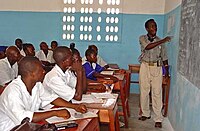
Photo from wikipedia
Abstract This paper provides a review of the condition of South Korea’s new teacher evaluation system, focusing on the conflict among political actors (i.e., government, political parties, teachers, teacher unions,… Click to show full abstract
Abstract This paper provides a review of the condition of South Korea’s new teacher evaluation system, focusing on the conflict among political actors (i.e., government, political parties, teachers, teacher unions, and the media) involved in the development and implementation of the new policy. Furthermore, based on a review of data from MEST reports on teacher evaluations, this paper argues that the new policy has failed to meet its intended goals for both teachers and students. Although most schools have encountered difficulties in implementing the policy successfully, a few schools developed new approaches for successfully adapting the policy at the local level, as evidenced by document analysis of three case studies. This paper applies McLaughlin’s (1990) and Thorn and Harris’s (2013) theoretical perspectives that the success of educational policy in individual schools depends on mutual adaptation with essential input from local actors (e.g., teachers) rather than uniform implementation enforced by federal policy.
Journal Title: Studies in Educational Evaluation
Year Published: 2019
Link to full text (if available)
Share on Social Media: Sign Up to like & get
recommendations!